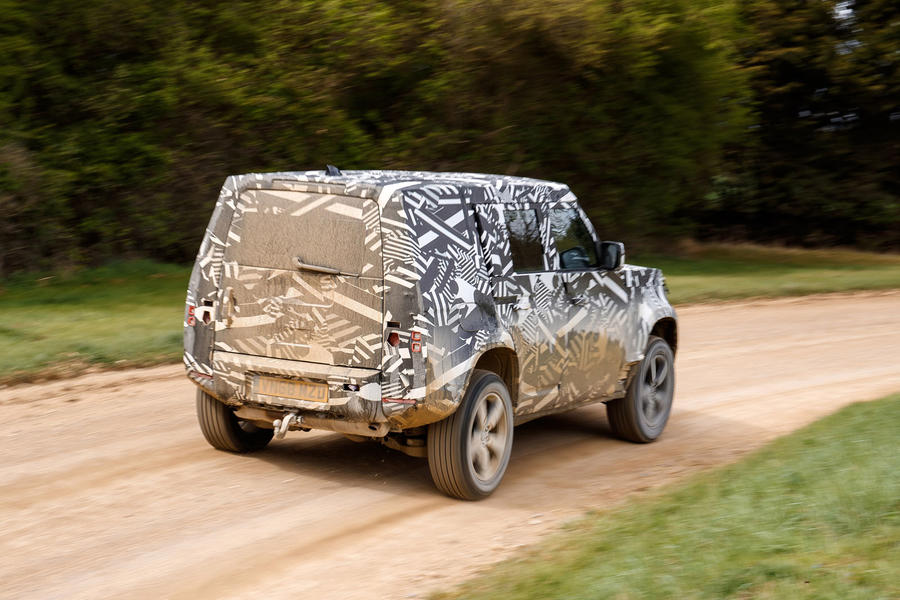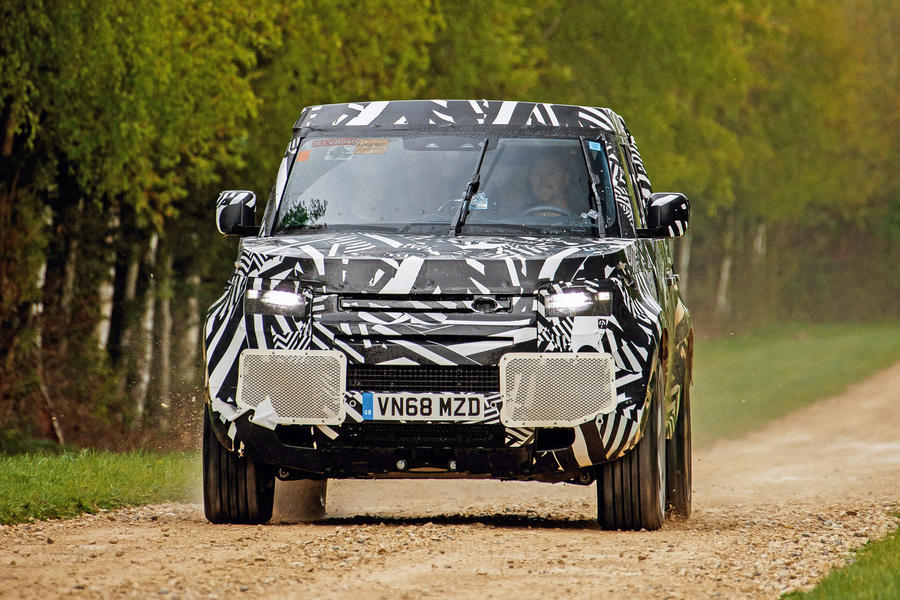Can the all-new Defender really fill the off-road shoes of its durable, reliable, go-anywhere predecessor? We hitch a ride in a development mule to find out
You don’t have far to go from Land Rover’s UK headquarters these days to find the developing world.
This is not, rest assured, because Brexit is biting particularly hard around the English Midlands and property prices in leafy Leamington Spa have suddenly taken a drastic turn (heaven forbid). It’s actually because there’s a rutted, ridge-strewn, pothole-ridden lane, made of gravel and mud and sand, at JLR’s head office proving ground, that’s called the Developing World test track – and it’s intended to be not unlike the kind of roads a Land Rover might be called upon to use anywhere from Kisangani to Kolkata, via the rougher agricultural spots of Kettering and the Kielder Forest.
And right now, wouldn’t you know it, there’s even a Land Rover on it. A real one. The Land Rover, you might say – and certainly so as far as anyone in product planning at the British firm is concerned. It is the direct descendent of the car with which the company was founded: ‘L663’, or the all-new Defender. And as you join us, it is being driven pretty hard by Land Rover’s Andy Deeks, product engineering team leader for durability and reliability, right over the aforementioned ruts, bumps, ridges and potholes.
Andy is driving quite sternly – angrily, you might even say, like a man with a point to prove. All the while he’s explaining that, while doing the data capture that is crucial to the engineering development of this car, his engineers drove harder still, doing their best to torture every rattle, wobble, shudder, clunk, squeak and eventual component failure from this car in order to pin them down and chase them out of the finished product, one by one. They seem to have done that pretty well, at least as far as I can tell from where I’m sitting – although I’ve only been here in the passenger seat for a few minutes.

That chasing process is now long over, of course. The all-new Defender is just weeks away from its grand unveiling to the press and public, and production is all set to start. It’ll be rolling off a production line in Slovakia – that much we already know. And it’ll be a different sort of Defender from the one that bowed out in Solihull in 2016 after nearly seven decades of almost continuous production. It was always going to be so: but how much different? Now’s our chance to at least begin to find out.
We’ll get technical chapter and verse on the car soon enough, Land Rover insists, when the official pictures are revealed and the prices are announced and the order books open – finally. Until then, the firm is spinning out what remains of the quite monumental sense of anticipation that’s been swirling around this car for just a little while longer – although it was good enough to answer what questions I could think to ask while being reacquainted with The Developing World track one English puddle, pothole, rut and bump after another.
The first thing you can think to ask, noting how well the suspension of the new Defender appears to deal with bigger impacts and how composed the body feels when subjected to bigger speeds and lateral loads, is what’s underneath the car: and the answer you’ll get might come as a surprise you.
“There have been a few Defender replacement projects over the years,” explains Deeks, “but with this one we elected to use the same aluminium model platform as the other bigger Land Rover models use. It’s called ‘D7U’. The platform has been through a programme of wide-ranging design and engineering overhaul – but it’s a monocoque. It’s relatively light and very stiff, and those are attributes we need. But there’s no ladder frame here, and we don’t have rigid axles.”
There is quiet in the cabin as I digest that bombshell, but for the sound of mud and stones crackling and pinging off the underside of the car. No rigid axles, eh? And no separate chassis? Lordy – there’ll be much muttering among the green welly crowd on that score. That’ll be why it feels so comfy, modern and dynamically sophisticated, then. So how on earth do you set about making the most rugged, capable, go-anywhere SUV in the world when you’re starting from there?
Deeks provides the answer, all the while flicking the big Defender from one side of the test track to the other with an economy of manually exerted effort which, to witness, might convince an old Defender owner to put one half of their body out to pasture in the lower field.

“Compared with the hardware you’ll find on a Range Rover or Range Rover Sport,” Deeks explains, “there are reinforced suspension subframes, as well as new stronger suspension arms, ball joints and bushes. We’ve got bigger wheel arches, more suspension travel, more wheel articulation and more ground clearance than on any other Land Rover. This car was designed to exceed the usual Land Rover capability targets that our other models are engineered up to. And it has been engineered for better durability and reliability than any car that Land Rover has ever made.”
Like its predecessor, the new Defender will be sold in short and long-wheelbase versions called ‘90’ and ‘110’ – although those numbers no longer correspond to exact wheelbase lengths in inches. Both versions have shorter overhangs and better approach and departure angles than any other current Land Rover (the improvements in breakover angle and turning circle are the only reasons you might prefer the shorter of the two for proper off-roading). Wheels will vary from 18in to 22in, with both all-terrain and mud-terrain tyres on the options list and bespoke ‘terrain response’ traction control software tuned to make the most of the extra off-road ability those tyres offer.
The car’s four-wheel-drive driveline, meanwhile, will have a more hardcore standard specification than on a like-for-like Discovery, with electronic locking differentials likely for both axles. Land Rover wouldn’t be drawn to confirm whether low-range transfer gearing would be available, or whether the first gear of the car’s eight-speed automatic gearbox was intended to be short enough to take care of even the most testing of off-road demands. But modern auto ’boxes being as they are, there’s a good chance it might.
“The suspension hardware is related to the stuff on those other cars, but it’s very differently applied and tuned,” Deeks goes on. “Steel coils are standard fit, air suspension is optional. But we’ve got special controls monitoring the adaptive dampers, for example, to ensure they don’t overheat when working really hard. If you have the air suspension, we reckon the car is better able to keep its wheels on the ground and its body clear of obstacles than it would on rigid axles anyway.”
At that, I wish he would spear off the track we’re on and drive directly up the side of a rock face or sand dune, or go boulder-crawling, in order to prove the point. That’ll be for another day, I guess. Instead, Deeks continues aiming at the potholes, working the Defender’s suspension hard into each one but with little drama or coarseness on impact, and he begins to explain why the idea of a reliable modern Land Rover need not necessarily be such a challenging contradiction.

“We know what reputation our cars have, and what some people will expect and say about the Defender,” he says. “This is a much more complicated car than the old one, that’s true. Engineering in the durability, the capability and the lightness we wanted would have been easier with less complexity. But nobody said this would be an easy car to make.” He talks with the determined look of a man who makes that particular point quite a lot, then describes in detail one of the sources of his confidence.
There’s a testing rig used by Land Rover during the development of its modern cars. Company engineers refer to it as ‘6DOF’, which, as Deeks explains, stands for Six Degrees of Freedom. It is, in effect, a very advanced, electronically operated, giant robotic tool than can move a car through every dimension in which it can be moved, either on the road or off it. The six degrees in particular, if you’re interested, are heave, surge, sway, pitch, yaw and roll. Sadly, Kevin Bacon is not involved, but all you’d need is a Ronan, Robbie or Romeo and you’d have a winning boy band line-up, I reckon.
“The testing mileage we do in person, here on the Developing World but also on Tarmac handling courses, on special surfaces like Belgian pavé, and also during kerb strikes, jumps and bottoming impacts, is logged digitally. For ‘L663’, our ‘6DOF’ input calibration was tougher and more punishing than any we’ve used before. Then we feed it into the computer and the rig repeats the inputs, putting the equivalent of 150,000 miles and a decade of extreme stresses and strains into the car, running 24/7, in a matter of weeks. When it’s finished, we tear down the car, see where the weaknesses are and redesign or respecify as necessary.”

As we complete one last lap of the muddy lane we’ve been chewing up for a good half an hour, Deeks says he wasn’t always sure that replacing the Defender was a good idea. He also appreciates that the car his team has replaced it with is quite a different prospect than the Defender once was. “Before this project started, I went back and forth on the ‘should we, shouldn’t we?’ question,” he admits. “But having spent so long working on ‘L663’, I’m glad we did.
“It’s not a car of the same simplicity as the original, granted. It has its own character. But it’s easily tough and capable enough to be worthy of the name: more than, in both cases. The old Defender was a car that was durable because it simply wasn’t comfortable enough to drive it quickly off-road. This new one absolutely is – and trust me, it can take whatever punishment you’re prepared to ask of it.”
Does that mean the infotainment system will always work, I wonder, or that the engine management warning light won’t blink on at 6am on an average Tuesday, or the parking heater won’t start smoking like Dot Cotton on wash day. Will the new Defender be reliable in the boring, daily-grind sort of way that Land Rovers are fairly widely regarded as not really being? We’ll see, won’t we? There’s certainly plenty to prove.
This clearly won’t be a car you can take spanners to yourself, with easily changeable body panels and the like. But it should inherit some known-quantity reliability from Land Rover’s existing platform mechanicals, and it sounds like it’s been through the toughest development process that Gaydon could come up with in order to banish whatever nasty surprises might have been let in at the same time.
Just as Deeks clearly knows, people will think what they’re going to think about this car. Pretty soon, though, we’ll find out whether the new Defender might just be a car to remake a reputation, just as its famous forebear once made one from scratch out of mud, grit and graft.
READ MORE
New Land Rover Defender tests with Red Cross in Dubai
Reborn Land Rover Defender crucial to firm’s 2019 revival
Land Rover Defender: details of new Defender family leaked
Source: Autocar
